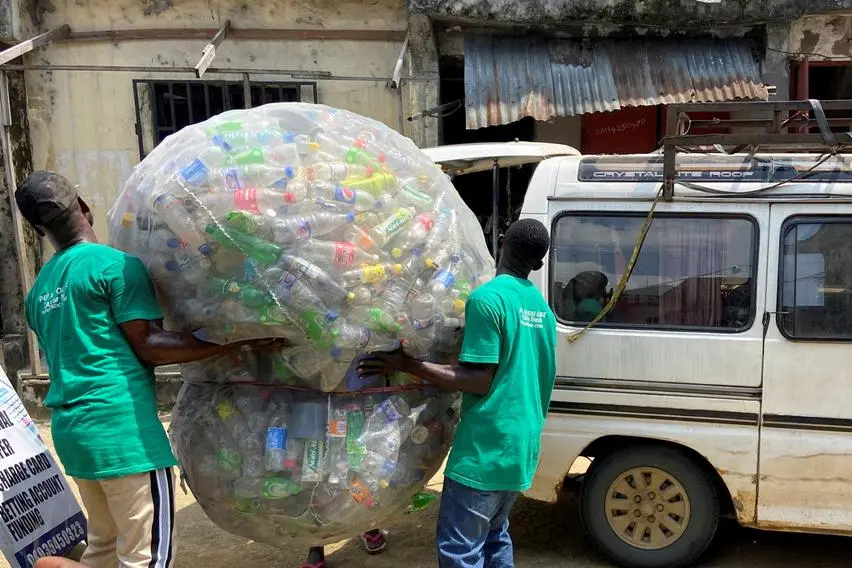PHOTO
Lagos, Nigeria’s economic capital, known for its vibrant way of life is home to hustlers and dreamers. The possibilities in Lagos are endless; it’s a city where anybody can be anything. Amidst all the beautiful things happening in the city, a challenge that has been taking so long to tackle is littering and waste management. Litter is everywhere, sneaking into gutters, clogging waterways, and lining the streets.
From the busy streets of Oshodi to the narrow roads of Isale Eko, discarded plastic bottles and overflowing bins are turning Lagos into a chaotic city. Lagos generates over 13,000 metric tonnes of waste daily, yet nearly half never makes it to the dump site. Instead, waste rots in corners, polluting the environment and putting the city’s ecosystem in danger. And the consequences? Flooded streets, toxic waterways and an ecosystem on life support. And while Lagosians quickly point fingers at the government, we all know everyone is part of the problem.
The big question is: Can Lagos kick the waste habit?
Related Posts Lagos-Ibadan is long overdue for another road —Federal Controller of Works, Lagos 2025: We’ll redouble efforts in every sector — Sanwo-Olu We listen, we don’t judge
With a population exceeding 24 million, Lagos is Africa’s largest city, and its growth shows no signs of slowing. Unfortunately, the waste management system has failed to keep up with its growing population. Public waste bins are a rarity. Have you seen one recently while in transit? The habit of tossing trash into gutters or out of a moving car has become second nature for many.
Another issue is the lack of awareness. Many residents don’t know how or why they should separate recyclable waste from organic waste. This goes beyond ignorance; it’s a culture of convenience, where quick fixes beat long-term solutions. The result? Lagos drowning in its mess.
Enter the Sweep Eko Initiative, a bold campaign from a group of MSc Media and Communication students at Pan-Atlantic University’s School of Media and Communication (SMC), to rescue Lagos from the grip of waste. This isn’t just another clean-up operation. Sweep Eko is aiming for something bigger: the initiative wants to change the mindset of Lagosians. Instead of pointing fingers, Sweep Eko is rolling out creative ways to educate people on waste disposal, recycling and the importance of keeping the city clean. With clear ‘edu-taining’ content across social media, the initiative is set to transform Lagos one Lagosian at a time.
The goal is clear: to create a city where proper waste disposal isn’t just a government mandate, but a way of life.
On a recent clean-up outreach near the second bridge in Ikeja, it became painfully clear just how widespread the issue is. The group of students noticed a stark absence of waste bins, leaving residents and passers-by with nowhere to dispose of their litter. In frustration, one person we spoke to asked, “Where should we put it?” The lack of infrastructure is a major barrier to proper waste management, and without bins in sight, it is no surprise that people resort to throwing waste on the ground.
While the streets may give the impression that nothing is being done, the Lagos State Government is working tirelessly to address the waste crisis. The Lagos Waste Management Authority (LAWMA) has implemented various initiatives to improve waste management and promote sustainability. From introducing a two-bin system for households to launching the Eco Circulate campaign to promote a circular economy, the state is taking significant steps toward reducing waste and encouraging recycling. LAWMA has also announced plans to close down landfill sites like Olusosun and Solous, transforming them into renewable energy stations, a bold move toward tackling the city’s growing waste problem.
But despite these efforts, the reality on the ground suggests that much more needs to be done. The waste crisis is not only about the absence of bins or inefficient waste collection, it’s also a cultural issue. Many Lagosians still view waste disposal as a problem for the government to solve, rather than a shared responsibility. Changing this mindset is crucial, and it starts with initiatives that engage the public and encourage a sense of ownership.
One such initiative has been the recent shift towards plastic bottle collection for a fee. People have begun collecting discarded plastic bottles from the streets, often for a small fee. This new development provides a financial incentive for individuals to clean up their environment and promotes the idea of recycling and waste recovery. More initiatives like this, which create jobs and encourage responsible waste disposal, are essential for tackling the city’s waste challenges. The state can foster a responsibility culture by rewarding people for picking up litter and recycling while addressing the growing waste crisis.
The path to a cleaner Lagos requires a concerted effort from the government and the public. The government must continue to invest in infrastructure, provide more bins, and expand initiatives like the plastic bottle collection programme. At the same time, Lagosians must take ownership of their environment, ensuring that waste doesn’t just end up in the streets but is properly sorted, recycled, and disposed of.
The stakes are high. Flooding, disease, and environmental degradation are just some of the consequences of ignoring the waste problem. But with the right mindset, collaboration and innovation, Lagos can overcome its waste challenges and set an example for other megacities around the world. It starts with us—the residents, the government and the businesses working together to create a cleaner, greener Lagos.
The question remains: will we rise to the challenge?
Copyright © 2022 Nigerian Tribune Provided by SyndiGate Media Inc. (Syndigate.info).





















